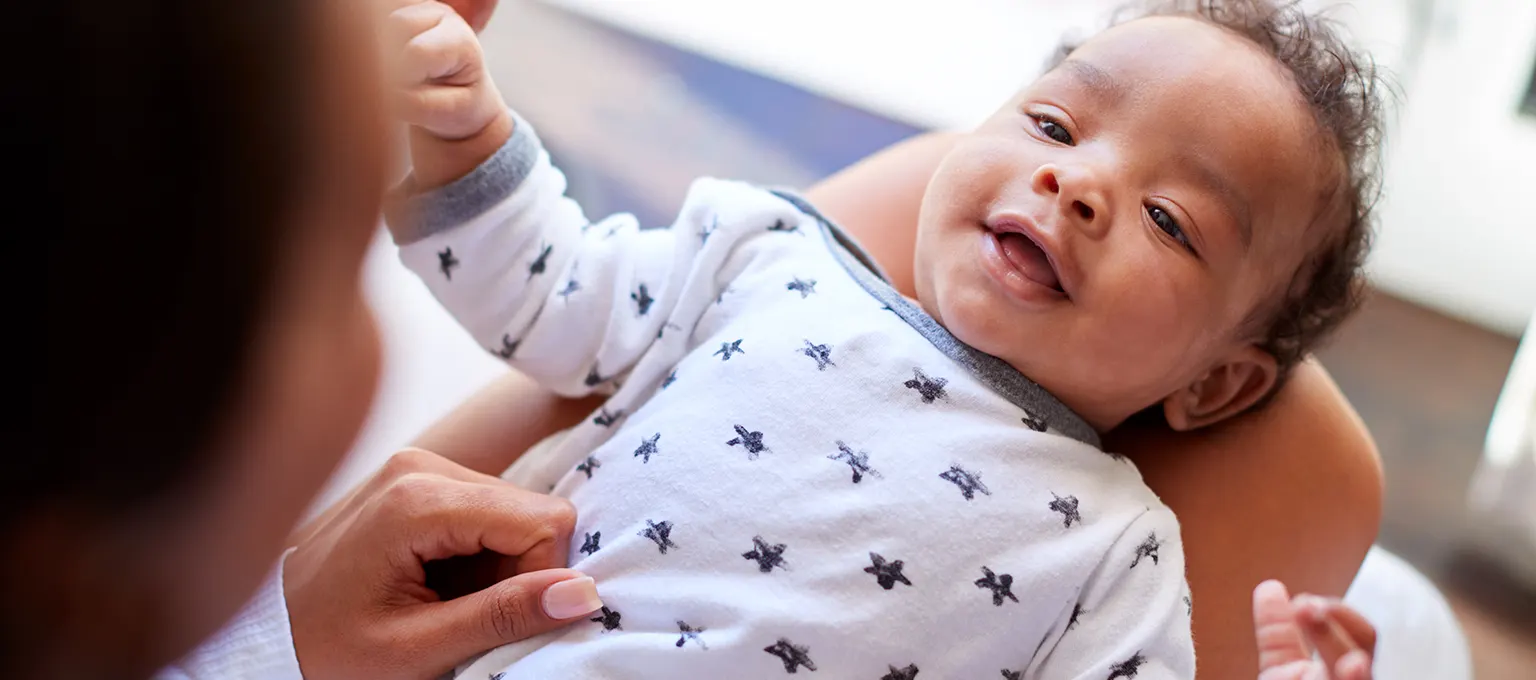When Do Babies Start Smiling?
Seeing your baby look up at you and smile for the first time is a moment that will melt your heart and stay with you forever.
If you’re wondering when your baby will smile for the first time on purpose as her way of showing you just how happy she is to see you, you’ve come to the right place.
Although your baby’s initial smiles are reflexive, be patient and soon enough you’ll notice that first true smile. Next thing you know, your baby will be smiling all the time in response to the entertaining sounds and faces you make, and even just the sight of you as you smile at her.
Read on to find out what’s behind your baby’s first smiles, to discover a few ways you can encourage your baby to keep smiling, and to learn what to do if you’re concerned that your little one isn’t smiling yet.
Your Baby’s Initial Reflexive Smiles
During your baby’s first month, you may notice her smiling during her sleep. This is called a reflexive smile.
Although no one know for sure what triggers reflexive smiling, experts think it might happen when babies respond to an internal stimulus during sleep.
This type of smiling isn’t the real deal yet. You’ll have to wait a little longer before you see your baby flash her first real smile, sometimes called a social smile.
Your Baby’s First Real Smile: A Sign of Development
It can be quite rewarding to see your baby smile during sleep, but the real smiles will likely come a little later, and you’ll absolutely adore the sight of these tiny grins.
These true smiles happen when he’s awake and alert — not in his sleep.
Although your baby may experiment with grins and grimaces in the first month, especially in response to others smiling at him regularly, it’s actually in the second month that these typically turn into genuine smiles that signal pleasure and friendliness.
This will be a memorable moment in your life as a parent, reaffirming all your hard work and reassuring you that your baby is happy.
These first smiles are also a key milestone in your baby’s development.
Your baby will start to realize that moving his lips and grinning will bring him more attention from you and others. As he becomes more in tune with you and more socially engaged with other adults and children, his brain development will advance. This increasing engagement may also help him become more distracted from everyday internal sensations like hunger, gas, and fatigue.
By about 3 or 4 months old, he’ll be socializing with almost everyone he sees by mirroring others’ facial movements. Of course, he’ll still have his favorites, that is, you and the people who care for him most often.
The more he socializes, the more he will appreciate these new experiences. This early form of socializing is all important to his ongoing social and emotional development.
Every baby develops in his own way and at his own pace. However, if your baby doesn’t start smiling at people by 3 months, tell your baby’s healthcare provider.
How to Encourage Your Baby to Smile
Your baby’s first smile will likely happen in the second month. Until then, be patient and know that eventually you will see that first smile.
Here are some tips to help encourage your baby to start — and keep — smiling:
Smile regularly. The more you smile at your baby, the more she’ll smile back. This type of give and take is sometimes known as smile-talking, and it usually begins in earnest when your little one is around 3 months old. By responding to your baby’s smiles and engaging with her by smile-talking, you will be encouraging her development. Responding to her lets her know that she’s important, that she can trust you, and that she has some control.
Play along. Your baby may start a “conversation” with you by flashing a wide smile or a big grin to get your attention. Sometimes she might wait for you to smile at her first, before responding with a matching smile. This is her way of imitating you. Her whole body might also reflect her happy face, as her arms might reach upward and her legs might move in excitement. Although it might look as if she is simply being playful with you, imitation is actually an important step in her social and emotional development. So, go ahead and play along with your baby.
Make eye contact. Try not to interrupt or look away from your baby when she’s smile-talking with you. Your concentrated attention lets her know that you are interested in what she has to “say” and that you value her opinion. These interactions will help nurture her self-esteem and communication skills, and teach her about body language.
If you haven’t seen your baby’s first true smile yet, you’re probably waiting with bated breath. Keep on smiling at your baby, and eventually, when the time is right, he’ll smile back. Once it happens, it will be an unforgettable moment, and you can be sure that from that point on your time together will be filled with lots of smile-talk, giggles, and grins from ear to ear.
One thing you might not be smiling about quite so much is how many diapers you’re changing at this time. Still, you’ll be smiling when you find out what kinds of rewards you can get for your Pampers purchases with the Pampers Club app. Once you have the app, simply scan the codes found inside Pampers packaging and start earning rewards like gift cards and coupons.
Join a World of Support
through Pregnancy and Parenthood.
TRACK WITH TOOLS
LEARN WITH EXPERTS
GET REWARDED




